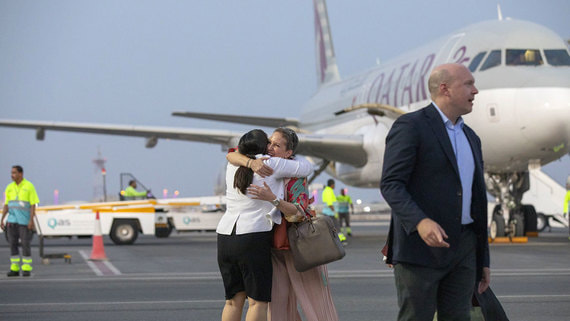Exchange of prisoners and unfreezing of some assets will not improve relations between Iran and the United States
[ad_1]

Five US citizens of Iranian origin are returning home from imprisonment in Iran. Three – Morad Tahbaz, Siamak Namazi and Emad Sharghi – served more than five years. The identities of the other two captives have not been released. In exchange, the United States released five Iranian citizens. Two – Mehrdad Moein Ansari and Reza Sarhangpour Kafrani – have already returned to Iran, and three, according to Al Jazeera, decided to remain in Qatar, where the exchange took place. The US also approved the unfreezing of Iranian assets in South Korean banks (Bank of Korea, Woori Bank and Industrial Bank of Korea) in the amount of $6 billion. Iran will only be able to use these funds for humanitarian purchases, such as agricultural products and medicines. Qatar acted as a mediator during the negotiations and guarantor of the deal.
Iranian President Ibrahim Raisi said the decision to release American prisoners was purely humanitarian in nature, hinting at the possibility of similar “humanitarian actions in the future.” He did not forget to reproach the United States for repeatedly violating previously made promises. US President Joe Biden thanked his partners for their “tireless efforts and assistance in achieving this result.” Biden did not forget to remind that the United States will continue to punish Iran for “provocative behavior” and announced the introduction of new sanctions against the former President of the Islamic Republic Mahmoud Ahmadinejad and the Iranian Ministry of Information (Intelligence).
However, news of the exchange did not cause a positive reaction among Republicans. Donald Trump wrote on his social network Truth Social: “<...> We gave them five very tough, smart people <...> but we also gave them $6 billion! How much of a kickback will Joe Biden get?” The White House, in response to numerous criticisms, replied that the unfrozen funds would not be transferred to Iran, but would be kept in special accounts in Qatari banks, thanks to which the US Treasury would be able to exercise full control over their use.
Under the 2015 Joint Comprehensive Plan of Action on Iran’s Nuclear Program (JCPOA), or nuclear deal, Iran pledged to reduce its nuclear program in exchange for the lifting of UN and Western sanctions. In 2018, US President Donald Trump announced America’s withdrawal from the agreement and imposed new sanctions.
Considering the current geopolitical situation, the resumption of the nuclear deal in any format seems extremely unlikely, Vladimir Vasiliev, chief researcher at the Institute of the USA and Canada of the Russian Academy of Sciences, told Vedomosti. The expert believes that the purpose of the agreements on the exchange of prisoners in the context of American policy was to slow down the active rapprochement of Iran with Russia and China. In addition, the deal was a kind of signal to Israeli Prime Minister Benjamin Netanyahu, who has repeatedly stated his readiness to strike Iranian nuclear facilities. Vasiliev explained that Washington is trying to prevent this, since these threats encourage Tehran to get closer to Moscow and Beijing.
The exchange of prisoners is not exclusively humanitarian in nature, but it is not enough for a possible resumption of negotiations on the nuclear deal, says Alexey Naumov, an expert at the Russian International Affairs Council. According to the expert, neither Tehran nor Washington are confident in the possibility of a constructive dialogue. In addition to certain advantages, the Biden administration will suffer some image losses, since part of the American political establishment will accuse it of making concessions to Iran. According to Naumov, the decision to exchange is aimed primarily at “testing the waters” and an easy de-escalation of bilateral relations.
The prisoner exchange is unlikely to have an impact on domestic politics in the United States, says political scientist Jan Veselov. “This event will not become an important topic in the upcoming presidential elections, where foreign policy rarely plays a big role,” says Veselov. But this event creates a precedent when, as part of a prisoner exchange, a country can demand and achieve at least partial easing of sanctions, the expert summarizes.
[ad_2]
Source link








